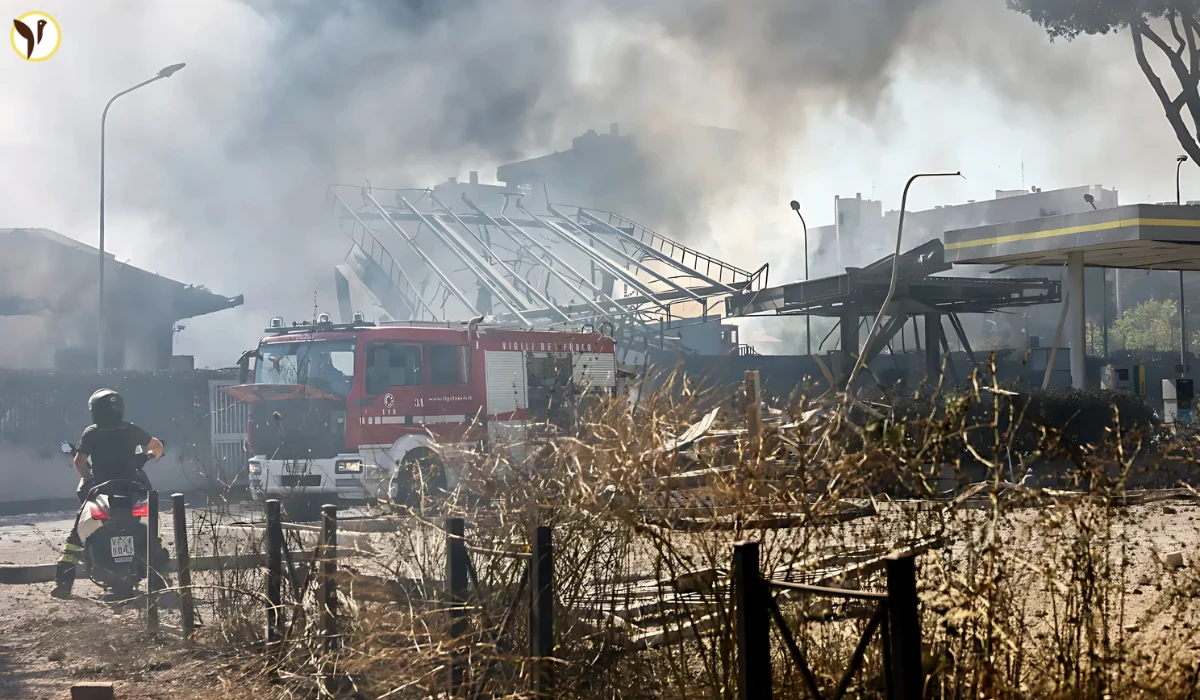The capital of Italy found itself shaken awake on Friday morning by an explosion at a petrol station in the Prenestino district. Over 20 people were maimed in the blast, including police, firefighters, ambulance staff, and civilians. It was like a jolt of an earthquake: bright flames, thick smoke, and an unshakeable wave of shock washing over the city.
Details of the Blast and Emergency
The first blast took place a little after 8 a.m. at the gas station refueling petrol, diesel, and LPG, and while rescue teams were already on the scene responding to a truck which crashed into an underground pipeline, a massive secondary blast erupted.
- At least 9 first responders (eight police officers and one firefighter) were injured—mostly burns and blast trauma.
- Several ambulance workers, bystanders, and station staff were also harmed—about five hospitalized with moderate burns.
- Nearby buildings shook and windows shattered.
- A metro station and local sports center where children were present were evacuated to ensure safety.
Witnesses in the area said it sounded like an earthquake, homes shook, alarms went off and panic spread across neighborhoods.
Where the Explosion Happened and the City Reaction
Flames and a large thick plume of black smoke engulfed Via dei Gordiani, seen for miles across eastern Rome. Emergency services were in the area—as it quickly became crowded with at least ten fire trucks, a number of ambulances, and several police units.
A tweet from BNO News captured the moment:
BREAKING: Large explosion at gas station in Rome, Italy, injuring at least 10 people - ANSA pic.twitter.com/h5L6nD1AaC
— BNO News Live (@BNODesk) July 4, 2025
Parents rushed to pick up kids from the sports center. Commuters rerouted when the nearby metro station closed. Sirens filled the air. Harried residents shared panic—many feared their homes had been destroyed, but thankfully no fatalities were reported.
Investigation & Safety Questions
Public officials have stated that the explosion occurred as the city was responding to a gas leak as a result of the pipeline crash. However, a series of new questions are starting to emerge:
- Pipeline safety: Could the crash have been prevented? Is the old pipeline's buried under the streets of a city problematic?
- Station maintenance: Witnesses say the crash occurred when a pump broke away from the station- could an error have triggered the explosion?
- Alarm systems: Many residents claim to have smelled gas shortly before the explosion--did the notification and alarm systems fail?
- Urban hazards: The underground pipelines and gas tanks beneath the homes raises the question if the safety of the city of Rome is putting residents at risk to unknown dangers?
Officials ordered immediate evacuations, followed up by inspecting Safety Procedures at stations across the city. As a public safety team, Roman officials have a job to make sure public spaces are safe and residential areas consider risks and hazards.
Emotional Tone & Community Impact
For locals, there is an element of disbelief and shock. "I thought I was in an earthquake- what a boom!" said a mother. "The smoke just rolled over us and we ran not knowing where to go."

Despite the fear of the event, people are looking out for one another -- sharing water, caring for children, and looking out for ambulance workers. Rome's Mayor and the Prime Minister of Italy expressed their support as well as Pope Leo XIV, who prayed for recovery during an unfamiliar event. While it is difficult to think positively when in pain, some communities are recognizing the ways they conceptualize community sustaining.
What You Should Know
- Stay away from the Via dei Gordiani area until authorities clear it—it is likely that transport will be detoured and delayed.
- Hospitals remain prepped—if you were in the area and feel dizzy, burnt or breathless, please seek medical assistance.
- If you smell gas or believe you are leaking something suspicious please report it immediately, it may save someone from another explosion.
- You should expect inspections and new safety regulations on pipelines and petrol stations in the city.
This tragic explosion shook Rome—but no lives were lost, which feels like a small miracle. As the city heals, real answers must follow. Inspecting old pipelines, tightening equipment rules, and improving early alerts can help avoid another tragedy. Rome is resilient—now it needs smart safety measures to match that spirit.









